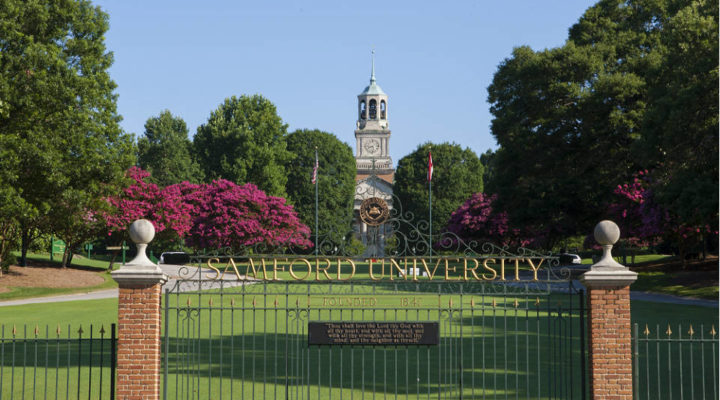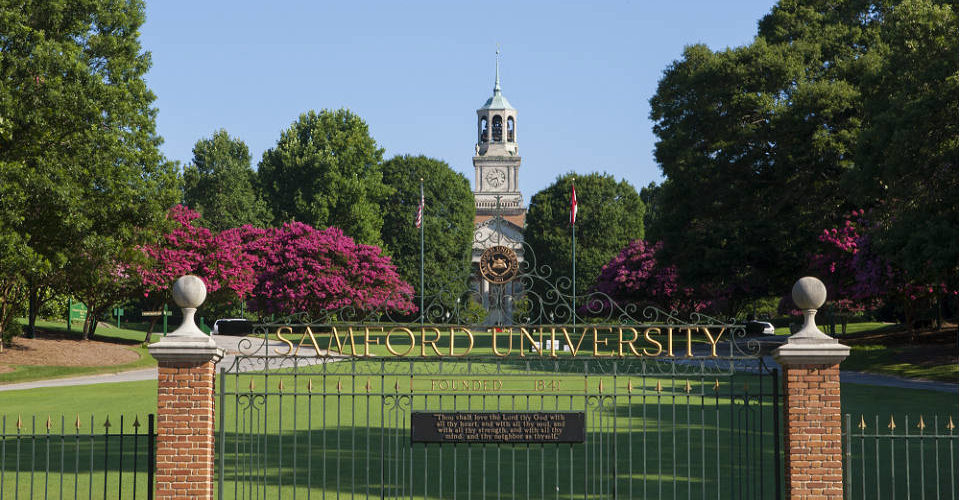A Samford University administrator’s claim that nothing has changed in the university’s approach to excluding churches and ministries that affirm same-sex marriage is infuriating to an alumnus and former staff member who spent a year working on plans for greater inclusion at the Baptist school.
Jordaan Whitehead was a student at Samford from 2008 to 2012, then she worked in the university’s Wright Center from 2012 to 2018. As a theater major and then an employee in the school’s performing arts center, she was well aware of the LGBTQ community on campus.
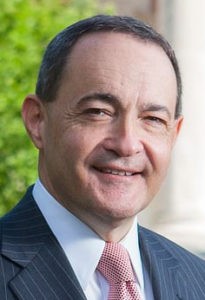
Andrew Westmoreland
Samford never was a fully welcoming place for gay and lesbian students, but they also weren’t singled out the way the current policy does, she said. And not that long ago, there was hope that things could get better, not worse.
In September 2017, then-president Andrew Westmoreland appointed a 12-member study group called the Working Group on Christianity and Sexuality. The group met from October 2017 through July 2018.
A copy of the group’s final report explains its purpose: “Our charge from President Westmoreland was to take the time necessary to discuss how Samford can better serve our university community around increasingly divisive issues related to Christianity and culture, especially issues related to human sexuality and to present, at the conclusion of our work, unanimous recommendations for the administration to consider.”
The 12 members included four current students, four faculty, two staff and two alumni. University Minister Matt Kerlin served in an ex officio capacity. It is Kerlin’s successor in the role now called campus pastor who initiated the current public conflict by denying two church-based groups access to the back-to-school ministry expo where they previously had been welcome.
After alumni and local clergy got wind of that action, they began rallying to oppose the change in policy. Although the university has been largely silent on its actions — administrators have not responded to requests for information and issued no public statements — on-campus communications have portrayed the anti-gay policy as nothing new.
In an email to students, Vice President Phil Kimrey said: ‘These guidelines are not new — they have existed for many years and consistently align with Samford’s mission, vision, and core values.”
However, the Guidelines for Guest Ministries document cites nothing about sexuality, gender or marriage. It does say approved organizations “must be affiliated with a recognized church, parachurch or other ministry organization,” should “have and observe a statement of faith and theological perspective that is consistent with the Mission, Vision and Core Values of Samford.”
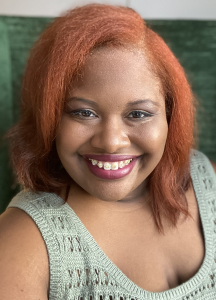
Jordaan Whitehead
To imply that there’s never been any conversation around the difficulty of LGBTQ conversations at Samford is disingenuous, Whitehead said.
“This was a year of my life. Why did we do this? I am truly disgusted that a place I called home so long … could be so flippant about members of our Samford community who identify as gay,” she said. “The contradictions are amazing. Phil Kimrey obviously was there when we did this. For him to say this is what we always have done is contradictory.”
Over the course of a year, the Working Group chiefly listened to diverse members of the university community, conducted a review and analysis of the policies and practices of peer universities around issues of faith and sexuality, and hosted a public panel of current and former students to discuss the experience of identifying as LGBTQ at Samford.
The group unanimously proposed four recommendations.
“There is tension and difficulty around issues at the intersection of Christianity and sexuality; these are complex matters, loaded with emotional freight,” the report noted. “The disagreement and division around these issues is reflected in the fact that after nearly a year of work we were only able to unanimously affirm four recommendations. Yet the group made tremendous progress in understanding around these complex issues. Thus, we see these recommendations as representing a beginning of efforts.”
“What happened? Nothing. We all agreed we would commit to another year, and nothing ever came of it.”
That beginning turned into an ending, Whitehead said. “What happened? Nothing. We all agreed we would commit to another year, and nothing ever came of it. I don’t know if the trustees ever saw the report.”
The group’s report “tried to frame recommendations which could begin to address urgent concerns expressed by the LGBTQ community while retaining the flexibility to also explore other important issues.”
And then as if foreshadowing the current crisis, the group said: “Some of our most important and ardent discussions revolved around the need to understand and respect the diversity of Christian opinion within our campus community. … The plain fact is that we have within our community near unanimity about the need to love and respect everyone, but we also have disagreement about how to extend that love and respect around issues of sexuality.”
The four recommendations were:
- Launch a multi-year, university-wide campaign called “Respect Everyone.”
- Evaluate housing policies and procedures to ensure sensitivity to and inclusion of minority communities, particularly LGBTQ persons.
- Begin an ongoing “Courageous Conversations” lecture series to address issues at the intersection of Christianity and sexuality.
- Extend the working group for another year.
When the report was given to the president in July 2018, Westmoreland had three more years at the helm before retirement. He was succeeded by Beck Taylor, who was elected president in March 2021.
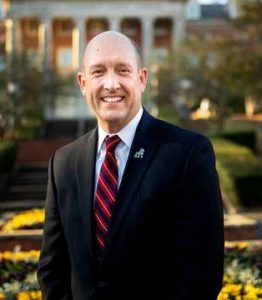
Beck Taylor
This is the beginning of Taylor’s second academic year leading Samford. Although he has made no public comment on the university’s newly interpreted policy, he did send an email to all faculty, staff and students Tuesday, Sept. 20, after about 140 students, alumni and local clergy held a silent protest on campus.
Under the subject line “I was proud of Samford today,” Taylor mentioned the weekly convocation (chapel) service that was held and the fact that the protesters stood silently outside that building for the full hour of the service.
While hundreds of students heard the sermon preached inside, “another group of students, employees and alumni gathered on the steps of (the building) to express their disappointment about Samford’s recent decisions, particularly inasmuch as they impact our LGBTQ community. The group thoughtfully and respectfully exercised its right to speak on issues it believes in. Samford’s academic mission holds this responsibility to free expression and civil discourse as a central tenant of our life together. Samford will always be a place where people can disagree, even with the university. That’s what a place committed to learning looks like.”
Related articles:
Samford students organize silent protest over LGBTQ discrimination
I’m now banned from ministering at a place I love | Opinion by Rich Havard
We are hurt by Samford’s exclusion | Opinion by Erica Cooper
100 clergy who are Samford grads urge president to reverse exclusionary policy
Samford, how long will you remain silent? | Opinion by Mark Wingfield
Samford University excludes Presbyterians and Episcopalians
Samford cancels Jon Meacham speech after ‘pro-life’ activists spark challenges

